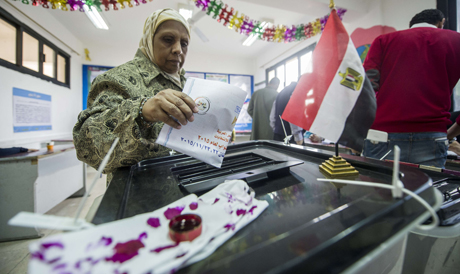
Archival photo from the 2015 parliamentary elections
Representatives of major political parties said this week that they have begun preparing to contest the Senate election which is due next month and will run in the polls either independently, or as part of a coalition of parties.
On 4 June the National Elections Authority (NEA) announced that the Senate polls will be held in Egypt on 11 and 12 August, and that Egyptian expats will vote on 9 and 10 August.
This is Egypt’s first election for a second chamber since the Shura Council was dissolved in 2013. The 2014 constitution did not envisage a second house, though constitutional amendments passed in 2019 returned the council. A law governing its work and formation was passed earlier this year.
NEA head Lasheen Ibrahim said candidates can register between 11 and 18 July from 9am to 5pm. Election committees will be set up in first instance courts to receive registration papers.
Election re-runs will be on 8 and 9 September, from 9am to 9pm in Egypt, and on 6 and 7 September for Egyptian expats. “The final results will be announced on 16 September at the latest,” said Ibrahim.
“The Senate elections will be fully supervised by judges and the media, and Egyptian and foreign civil society organisations will be permitted to monitor the poll,” said Ibrahim.
Face masks will be compulsory at polling stations and “there will be strict measures for campaigning and voting to prevent over-crowdedness.” According to Ibrahim, “the number of polling stations will be increased to ensure there is no overcrowding and adequate social distancing and other precautionary measures are observed.”
The NEA revealed on Monday that Senate hopefuls will require a coronavirus-free certificate in order to be eligible to register. “Hopeful candidates can get these certificates from hospitals and labs affiliated with the Ministry of Health,” said the NEA.
The army announced on Monday that military officers will not be allowed to contest general elections (presidential, parliamentary or municipal) unless they get prior approval from the Supreme Council of the Armed Forces (SCAF).
“Army officers, whether still in service or retired, cannot run in general elections unless they have prior permission from SCAF to do so,” rules a new law drafted by the army.
Ibrahim said he hopes the first Senate election will be a democratic step forward and enhance respect of public freedoms and human rights.
Legislation regulating the Senate was approved by parliament on 17 June and ratified by President Abdel-Fattah Al-Sisi on 2 July. The law states that the Senate will include 300 seats, one-third of which will be elected via the individual candidacy system, a third by closed party lists and a third to be named by the president. The law stipulates that 10 per cent (30) of the Senate’s seats be reserved for female candidates.
Under the law, 100 independents will be elected in 27 districts, with the number of senators each returns depending on the size and population of the district. The most densely populated districts, such as Cairo, will elect 10 independent members.
There will be four party list districts, two of which will elect 15 representatives each, and two will elect 35 each. Under the closed party list system adopted a single party or coalition of parties that gains 51 per cent of the votes in a certain district will take all the seats.
Ashraf Rashad, secretary-general of the Future of the Homeland Party told Al-Ahram Weekly that the party is closely coordinating with other parties to contest the election on a unified list. “We want an election coalition, and not a political alliance, that can contest the poll and win the party list seats,” said Rashad. “A number of political parties have already agreed to join the coalition.”
Rashad said political parties which join the coalition with the Future of the Homeland Party should ensure their parties are of good reputation, enjoy a degree of popularity, a high level of education and adequate political background.
Osama Abul-Magd, the parliamentary spokesperson of the Guardians of the Nation Party, has said his party will join forces with the Future of the Homeland. “This is the best strategy for us. It will be difficult for any party to stand alone and gain more than 50 per cent of the votes in the enormous Senate districts,” said Haridi.
Tayseer Mattar, chairman of the Will of the Generation Party, has also indicated he is willing to coordinate with Future of the Homeland over the Senate elections.
Yasser Al-Hodeibi, deputy chairman of the Wafd Party, said in a press interview that his party will join the Future of the Homeland coalition for the Senate election.
“A coordination committee has already been formed to prepare lists which will include candidates from different parties aiming to contest the Senate election in all districts,” he said.
Moussa Mustafa Moussa, head of the Ghad Party, revealed that the Future of the Homeland coalition will include a minimum of 10 political parties though “it could include more by the time registration opens next Saturday.”
A number of political analysts expect the Senate election will attract a low turnout.
“I think the coronavirus, coupled with the absence of popular interest, means the turnout will be very low,” said Al-Ahram political analyst Amr Hashem Rabie. He recalled that the last Shura Council election, held in 2012, attracted just 10 per cent of eligible voters.
The NEA says the number of eligible voters in Egypt stands at 63 million. The Senate poll will be followed by House of Representatives elections in November.
*A version of this article appears in print in the 9 July, 2020 edition of Al-Ahram Weekly
Short link: